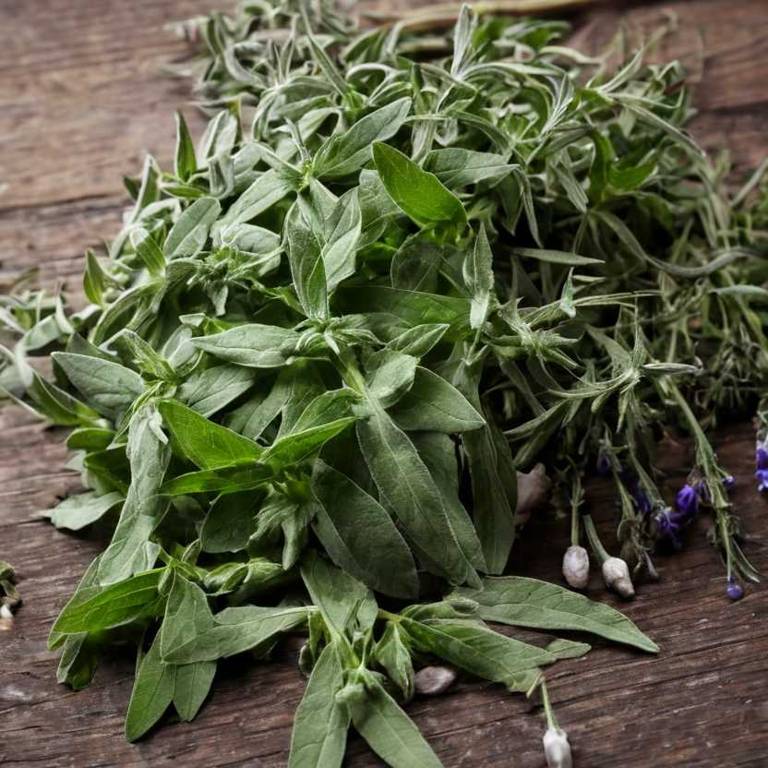10 Best Salvia Sclarea Preparations

The best medicinal preparations of Salvia sclarea are teas, decoctions, tinctures, essential oils, and syrups, each offering unique therapeutic benefits.
Herbal teas made from dried leaves and flowers are commonly used to promote relaxation and support digestive health.
Decoctions, which involve boiling the roots, are often employed for their deeper medicinal properties.
Tinctures provide a concentrated form of the herb, ideal for addressing specific ailments.
Essential oils derived from the plant are valued for their aromatic and therapeutic uses in aromatherapy and topical applications.
Below there's a list of the 10 best herbal preparations of salvia sclarea for medicinal purposes.
1. Teas
Salvia sclarea teas is commonly used to promote relaxation, alleviate menstrual discomfort, and support digestive health.
This herbal preparation is often employed to treat conditions such as anxiety, insomnia, menstrual cramps, and gastrointestinal issues like bloating and indigestion. The bioactive constituents responsible for its medicinal properties include compounds such as sclareol, rosmarinic acid, and flavonoids, which possess antioxidant, anti-inflammatory, and calming effects. These components contribute to its ability to reduce stress, ease muscle spasms, and support overall well-being.
Additionally, the essential oils in Salvia sclarea may enhance its therapeutic benefits when used in aromatherapy or topical applications.

2. Decoctions
Salvia sclarea decoctions is commonly used to treat a variety of ailments including anxiety, insomnia, menstrual cramps, and digestive issues.
This herbal preparation is valued for its calming and soothing effects on the nervous system. The most common medicinal uses include alleviating symptoms of stress, promoting relaxation, and supporting hormonal balance. Bioactive constituents such as essential oils, flavonoids, and phenolic compounds contribute to its therapeutic properties.
These compounds exhibit antioxidant, anti-inflammatory, and sedative effects, making Salvia sclarea a popular choice in traditional and modern herbal medicine.

3. Tinctures
Salvia sclarea tinctures is commonly used to promote relaxation, alleviate menstrual discomfort, and support hormonal balance.
These tinctures are often employed to treat ailments such as anxiety, insomnia, menstrual cramps, and menopausal symptoms. The bioactive constituents responsible for these effects include essential oils like sclareol and linalyl acetate, as well as compounds such as rosmarinic acid and flavonoids. These components contribute to the herb's calming, anti-inflammatory, and antioxidant properties.
Tinctures derived from Salvia sclarea are also believed to aid in digestive health and reduce stress-related conditions.

5. Syrups
Salvia sclarea syrups is commonly used to treat respiratory and digestive ailments, as well as to promote relaxation and improve sleep quality.
The most common medicinal uses of this herbal preparation include alleviating symptoms of coughs, bronchitis, and gastrointestinal issues such as indigestion and bloating. It is also used to reduce stress and anxiety due to its calming effects. The bioactive constituents responsible for these medicinal properties include essential oils like sclareol and linalool, as well as flavonoids and phenolic compounds that have anti-inflammatory, antispasmodic, and sedative effects.
These compounds work synergistically to provide the therapeutic benefits associated with Salvia sclarea syrups.

6. Capsules
Salvia sclarea capsules is commonly used to support hormonal balance, alleviate menstrual discomfort, and promote relaxation.
They are frequently used to treat conditions such as menopause symptoms, premenstrual syndrome (PMS), anxiety, and insomnia. The bioactive constituents responsible for these effects include essential oils like sclareol, rosmarinic acid, and flavonoids, which possess antioxidant, anti-inflammatory, and neuroprotective properties. These compounds contribute to the herb's ability to regulate hormonal activity and reduce stress.
Additionally, Salvia sclarea may aid in digestive health and skin care due to its soothing and regenerative properties.

7. Oils
Salvia sclarea oils is commonly used to relieve symptoms of menstrual cramps, anxiety, and insomnia due to its calming and analgesic properties.
This herbal preparation is also utilized for digestive issues, skin conditions, and as a natural remedy for stress-related disorders. The most common ailments treated include menstrual pain, hormonal imbalances, and nervous system disorders. The bioactive constituents responsible for these effects include essential oils such as sclareol, cineole, and linalool, which have anti-inflammatory, sedative, and antimicrobial properties.
These compounds work synergistically to provide the therapeutic benefits associated with Salvia sclarea oils.

8. Creams
Salvia sclarea creams is commonly used to treat skin conditions, promote wound healing, and alleviate symptoms of anxiety and insomnia.
These creams are often applied topically to address issues such as eczema, psoriasis, and minor burns due to their soothing and anti-inflammatory properties. The most common medicinal uses include reducing inflammation, improving skin health, and providing a calming effect on the nervous system. The bioactive constituents responsible for these effects include essential oils like sclareol, rosmarinic acid, and flavonoids, which exhibit antioxidant, anti-inflammatory, and sedative properties.
These compounds work synergistically to enhance the therapeutic benefits of the herbal preparation.

9. Linctuses
Salvia sclarea linctuses is commonly used to relieve respiratory symptoms such as coughing, bronchitis, and sore throat.
This herbal preparation is often employed to soothe irritated mucous membranes and reduce inflammation in the respiratory tract. The most common medicinal uses include treating coughs, asthma, and other respiratory infections due to its expectorant and antispasmodic properties. The bioactive constituents responsible for these effects include essential oils like sclareol, cineole, and terpenes, which have antimicrobial, anti-inflammatory, and bronchodilatory actions.
These compounds work together to provide therapeutic benefits for various respiratory ailments.

10. Lozenges
Salvia sclarea lozenges is commonly used to alleviate symptoms of respiratory and oral infections, such as sore throat, cough, and inflammation.
These lozenges are often employed to treat ailments like tonsillitis, pharyngitis, and even mild cases of colds due to their soothing and antimicrobial properties. The bioactive constituents responsible for these effects include essential oils rich in compounds like sclareol, cineole, and linalool, which possess anti-inflammatory, antiseptic, and analgesic qualities. Additionally, the presence of flavonoids and phenolic compounds contributes to its antioxidant and immune-supporting benefits.
This herbal preparation is valued for its natural ability to provide relief and promote healing in the throat and upper respiratory tract.
